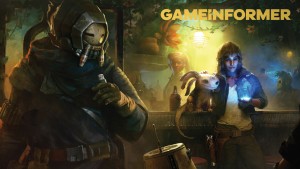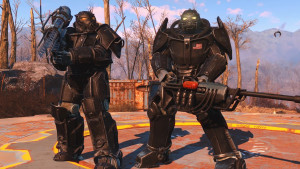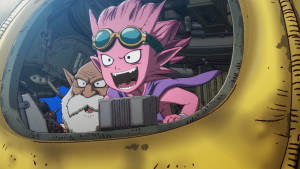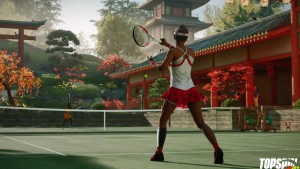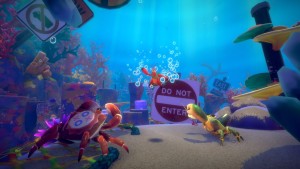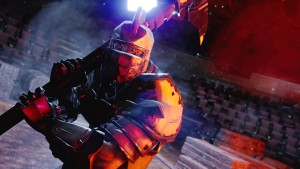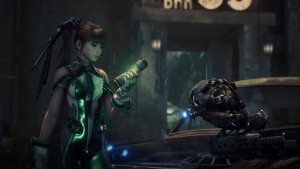Please support Game Informer. Print magazine subscriptions are less than $2 per issue
Afterwords – Horizon Zero Dawn

For years, Guerrilla Games has been synonymous with its sci-fi FPS series, Killzone. However, the studio's decision to change gears – and genres – for Horizon Zero Dawn has already proven an astounding success, selling over 2.6 million copies in less than a month. We recently spoke to the team about Horizon's intriguing world, characters, and gameplay, what the future holds for the fledgling series.
What was the most
difficult aspect about transitioning from first-person shooters to a huge
open-world RPG?
Hermen Hulst, managing
director: This project was out of our comfort zone on so many levels. Even
aspects that we felt were relatively "safe," such as our goal to preserve the
intense and tactical style of combat that we were accustomed to from the
Killzone series, proved much more difficult to achieve in an open world. We
quickly found that the designers for these combat encounters had far less
control over the position of the player character and the enemy characters than
they would have in a linear setting. And other project goals were just as
daunting. For example, we wanted to have a level of visual detail in Horizon's
open world that was similar to or greater than what we were used to from our
Killzone games; you can imagine the hurdles our tech and tools teams had to
take to achieve this.
But probably the biggest challenge was to create a new, believable, and inspiring science-fiction universe from scratch. The fact that Horizon takes place a thousand years in the future on a radically altered Earth means everything had to be imagined, researched, and conceptualized first. There weren't a lot of photographic reference materials or pop-cultural frames of reference we could use as shortcuts. Everything, from the setting to the story and the cultures and visual language had to be built from the ground up.
Jan-Bart van Beek, art director: There are plenty of technical challenges involved in going from a linear game to and open-world structure, but frankly the most difficult transition was a mental one. In first-person shooters, and most other linear games, it's all about controlling the emotional experience of the player. Every single second is carefully scripted and designed in order to, almost literally, control every single heartbeat of the player. It's a carefully crafted rollercoaster. But like a rollercoaster it is on rails. It's exciting and exhilarating, but the player's control and agency is a well-crafted illusion.
Transitioning from this is very hard. A designer doesn't control the variables they are used to. The player can come from any direction into an encounter, with any set of weapons, at any experience level, and from many different previous quests. He might be idly strolling about, with a full inventory of ammo. Or she might be running on empty with 20 giant machines in tow.
In the early days, when something didn't work, there was a tendency to go back to the old playbook: try and control the player. Restrain the freedom. Limit the options. It took a while before we could shake that habit and trust the overall system of the game to allow the player to be in control. When making an open-world game, don't design the rollercoaster; design the theme park.

What do you think is
the biggest drawback to open-world game design, and how did you approach that
problem when making Horizon?
Mathijs de Jonge, game
director: Well, one challenge is defining the variety and density of
interactive content in combination with the openness of the world. For Horizon,
we spent quite a bit of design time on figuring out the pacing and placement of
content. One example of how this turned out is how the world gradually opens
up, in essentially three stages. This approach helped us with introducing new
features, machines, and activities (to name a few), with a certain rhythm to
motivate players to keep going and at the same time not overwhelm them with
options.
Many open-world games
suffer from bugs due to their large scope, but Horizon is remarkably stable.
What is it about Guerrilla's process that helped you avoid this common
pitfall?
HH: Our test
approach is based on three pillars: test team structure, tools, and test
strategy. With the team structure, we went for a core of embedded specialist
testers who had ownership of various areas of the game, and who were the
absolute experts in those areas; that deep knowledge and expertise allowed them
to find issues faster and to communicate better with the developers. The
multitude of testing tools and debug views allowed us to test more efficiently,
while at the same time providing crucial information for developers that helped
them fix the bugs faster. And lastly, our use of innovative exploratory testing
techniques and a risk-based approach to testing allowed the test team to focus
their efforts with minimum waste.
One of the few
criticisms lodged at Horizon is that some aspects like clearing out bandit camps
and following Detective Mode-style trails are too derivative of other
open-world games. What are your thoughts on this criticism?
MdJ: It's been a
big project for us and I'm really happy how it all came together. I see a lot
of praise for the variety the world offers and the experience as a whole. That
some parts don't shine quite as brightly as others is something that was kind
of inevitable due to the scope. We are looking closely at any critiques as part
of plotting out our plans for the future of Horizon.
There are eight main
weapons in Horizon, but you can only assign four to the weapon wheel at a given
time. Why limit the player's ability to quickly swap between weapon types?
MdJ: At some point
we had more weapons on the wheel but the controls got in the way with how quick
we wanted the switching process to be; it just got too finicky. We have some
ideas on how we can improve weapon/loadout switching, but I can't share
anything on this yet.
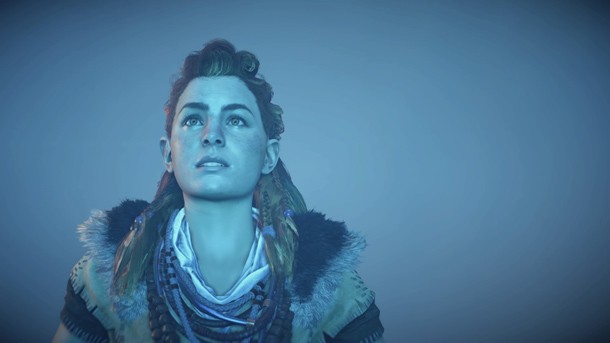
Aloy is an atypical
protagonist for action games. What were your goals for her personality and
story arc?
John Gonzalez,
narrative director: Our goal was to create a complex, compelling
protagonist with a deeply personal reason to explore the game's huge open world
and learn its secrets. The big mysteries of Horizon's world – Where did the
robots come from? How did humans forget their knowledge of technology? – are
tantalizing, but ultimately impersonal. If the main quest had been limited to
answering those questions, it would never have been more than a fact-finding
mission. So we made sure that Aloy had skin in the game. She doesn't go
questing to understand the world; she goes questing to understand where she
came from and who she is.
As for her personality, we gave that a lot of thought. We knew she had to be tough. We knew she was clever. But she's also fundamentally wounded. Her upbringing as an outcast has deprived her of something she needs. This missing piece is, of course, what drives her quest. But it also drives her actions as she meets characters throughout the game. Having suffered so much as a child, she can't help but empathize with others and want to relieve their suffering. This helped us give the game's side quests had emotional hooks – reasons for Aloy to get involved, sometimes despite her better judgement.
Aloy runs into
several male characters that show some romantic interest in her, but Aloy is
disinterested and at times put-off by their advances. What discussions did you
have about Aloy's gender and the decision to not pursue a romantic subplot?
JG: We did
consider including romances with a number of male and female characters, but in
the end we came to the conclusion that romances would distract from Aloy's
story rather than enrich it. In the period of her life that's portrayed in
Horizon Zero Dawn, Aloy is driven by her need to solve the riddle of her
origins. She's also in near-constant danger. She simply has too much going on
to let her guard down and make deeper connections. Nor, thanks to her
upbringing, has she had any prior experience forming such connections.
Accordingly, her interactions with NPCs often come off as a bit arch,
sarcastic, or defensive. When, despite that, an NPC makes a pass or otherwise
shows interest, it strikes her as strange or uncomfortable.
What was appealing
about the environmental features of Colorado and Utah that drew you to base the
game's futuristic setting there?
JBvB: This
was an element that was already in the very first concept pitch. We wanted to
have a lot of ecological variety in the game. And we wanted an area that in
itself would be very recognizable because of its iconic landscapes and natural
landmarks. Utah and Colorado very much fit that requirement.
Monument Valley is probably America's most iconic landscape; it's the postcard image of the Wild West. But the whole area is just full of incredible sites, such as Maroon Bells, Bryce, Lake Powell, Castle Valley, Chesler Park, Fisher Towers, the Flatiron, Roxborough Park, Garden of the Gods, Hallet Peak, Shark's Tooth, Pike's Peak and so, so many others. It really is an amazing place in real life, as well as in the game.

Many games sacrifice
a satisfying conclusion to set up a sequel, but Horizon answers all the big
mysteries it sets up. Were you afraid of hamstringing potential future
narratives by revealing too much?
JG: We didn't want
to play it safe and hold things back for some sequel that might never come. We
wanted to tell a complete story, and that meant we were obligated to pay off
the mysteries we set up. By the time you finish Horizon, you've discovered what
happened to the ancient world, the purpose of the robots, why Aloy was shunned
since birth, and her true origins. So yeah, if a sequel happens, we can't lean
on any of that. I suppose that makes our job as writers more challenging, but
challenge is good!
If a sequel does
happen, what's the number-one thing you would hope to change or expand on?
JG: We've been
absolutely humbled by players' response to the story and their emotional connection
to Aloy. Should a sequel happen, our number-one goal would be to respect that
connection by doing our utmost to create a story that resonates just as deeply.
We feel duty-bound to honor the time and emotion that players have invested in
Horizon. The last thing we want to do is disappoint the folks who have given
the game such passionate support.
JBvB: More machines. They are a lot of fun to design, build, animate, and play with. I wish we could have done a hundred. But reality is a harsh mistress; it doesn't allow you to make hundreds of machines.
What do you think of
the comparisons some gamers have made between Horizon and The Legend of Zelda: Breath
of the Wild?
MdJ: I am very
much looking forward playing Zelda BOTW, both as a gamer and developer. I
haven't looked into the comparisons yet nor have I read any reviews on Zelda,
as I want to go in with clear view.
JBvB: I think there is no higher honor than to be compared to one of the most critically acclaimed games in the history of games, that is part of a franchise that is one of the most beloved franchises in the history of games. Not a bad place to be in with our first effort of making a game in a new genre.
For more on Horizon Zero Dawn, read our review, or check out our beginner's guide.


